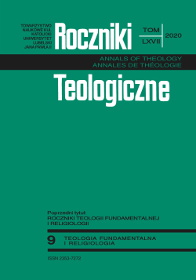Infallibility of the Bishop of Rome as an Ecclesial Issue ad Intra and ad Extra
Abstract
The infallibility of the Bishop of Rome has never been universally accepted in the Church. Controversies were present during the council debate after the solemn 1870 declaration but, even today, not all doubts have been clarified. They arose from the ecclesiological reflection within the Church, but were also a consequence of the ecumenical dialogue with other Christian communities. The aim of this paper is to present the ecclesial issues that arose soon after Vatican Council I, which led to the schism and to the emergence of the Old Catholic Church, and a similar situation after Vatican Council II, exemplified by the case of H. Küng. There is a significant theological issue of the relation between Church infallibility in the transmission of the saving truth and the papal infallibility in this regard. A key question arises from it: is the Bishop of Rome independent of the Church while announcing the truth with the official stamp of infallibility, or is he just expressing the truth developed within the community of faith? The present reflection and the answer to these questions places the papal subjectivity within the broad spectrum of the Church, anchoring his office in the dimension of the collegium of bishops and of the whole community of believers, who have a supernatural sense of faith. By this train of thought, it is possible to abandon understanding infallibility as a tragedy and to see it as a gift and charisma of the Holy Spirit.
References
ARCIC I. „Authority in the Church II”. W The Final Report, 81–98. Windsor CTS/SPCK/ Forward Movement London–Cincinnati, 1982.
Balter, Lucjan. Nieomylność encyklik papieskich. Studium teologiczno-historyczne. Warszawa: Akademia Teologii Katolickiej, 1975.
Bartnik, Czesław Stanisław. Dogmatyka. T. II. Lublin: Wydawnictwo KUL, 2003.
Beinert, Wolfgang. „Unfehlbarkeit”. W Lexikon für Theologie und Kirche, red. Walter Kasper, t. II, 389–390. Freiburg–Basel–Wien: Herder, 2006.
Beumer, Johannes. „Ökumenische Tendenzen auf dem Ersten Vaticanum”. Theologie und Philosophie nr 45 (1970): 385–397.
Clément, Olivier. „Bunt ducha i tragedia podziału. Kryzys chrześcijaństwa zachodniego”. Znak nr 2 (1992): 27–38.
Dettmer, Günter. Die ost- und westpreussischen Verwaltungsbehörden im Kulturkampf. Heidelberg: Quelle & Meyer, 1958.
Döllinger, Ignatz. Der Papst und das Konzil, Rivingstons. London–Oxford–Cambridge, 1869. Dostęp: 20.12.2019. http://www.archive.org/stream/a577134500dolluoft#page/n5/mode/2up
„Ewangelia a Kościół. ’Raport z Malty’”. W Wszyscy pod jednym Chrystusem. Ogólnokościelny dialog katolicko-luterański. Cz. 1, 1965–1981, red. Stanisław Celestyn Napiórkowski, 117–137. Lublin: RW KUL, 1985.
Ferdek, Bogdan. „Spór o nieomylność papieża. Od ‘Haec sancta’ do ‘Pastor aeternus’”. Poznańskie Studia Teologiczne nr 29 (2015): 183–196.
Hryniewicz, Wacław. „Pytania o prymat”. Tygodnik Powszechny nr 4 (1998): 9.
Ireneusz z Lyonu. Adversus haereses III, 24, 2. Seria: Antologia patrystyczna, red. Andrzej Bober, 48–76. Kraków: Wydawnictwo Apostolstwa Modlitwy, 1966.
Jasiński, Janusz. „Początek ostrego konfliktu monarchii pruskiej z Kościołem katolickim a kwestia braniewskich starokatolików (1870–1872)”. W Posłannictwo Biskupa Rzymu, red. Jacek Jezierski, 241–265. Olsztyn: Wyższe Seminarium Duchowne Metropolii Warmińskiej Hosianum, 2002.
Kasjaniuk, Elżbieta. „Nieomylność”. W Encylopedia katolicka, t. XII, 1148. Lublin: TN KUL, 2009.
Kasper, Walter. „Il ministero petrino”. Il Regno – documenti nr 48 (2003): 432–439.
Kongregacja Nauki Wiary. „Katolicka odpowiedź na Raport końcowy Międzynarodowej Komisji Anglikańsko-Rzymskokatolickiej, 6 grudnia 1991”. W Ut unum sint. Dokumenty Kościoła katolickiego na temat ekumenizmu 1982–1998, red. Stanisław Celestyn Napiórkowski i inni, 120–127. Lublin: TN KUL, 2000.
Kongregacja Nauki Wiary. „Uwagi o Raporcie Końcowym ARCIC I, The Co-Chairmen”. W W trosce o pełnię wiary. Dokumenty Kongregacji Nauki Wiary 1966–1994, 181–190. Tarnów: Biblos, 1995.
Krasiński, Józef. Z kart Magisterium Kościoła. Sandomierz: Wydawnictwo Diecezjalne, 1998.
„Mysterium Ecclesiae. Deklaracja o katolickiej doktrynie o Kościele przeciw niektórym współczesnym błędom”. W W trosce o pełnię wiary. Dokumenty Kongregacji Nauki Wiary 1966–1994, 54–64. Tarnów: Biblos, 1995.
Pius IX. „List Apostolski Mirabilis illa constantia do biskupów niemieckich 4 marca 1875”. W Breviarium Fidei. Wybór doktrynalnych wypowiedzi Kościoła, red. Ignacy Bokwa, 271–272. Poznań: Księgarnia Świętego Wojciecha, 2007.
Przedpełski, Borys. „Sobór Watykański I i jego recepcja. Spojrzenie teologa starokatolickiego”. W Posłannictwo Biskupa Rzymu, red. Jacek Jezierski, 59–71. Olsztyn: Wyższe Seminarium Duchowne Metropolii Warmińskiej Hosianum, 2002.
Przekop, Edmund. „Tendencje ekumeniczne w wypowiedziach przedstawicieli Kościołów wschodnich na I Soborze Watykańskim”. Prawo Kanoniczne nr 3–4 (1972): 61–80.
Rabiej, Stanisław. „Zakres nieomylności Kościoła”. W Pokładamy nadzieję w Kościele, red. Dawid Mielnik, 43–52. Opole: Koło Naukowe Teologów, 2016.
Reinkens, Joseph. Über päpstliche Unfehlbarkeit: enige Reflexionen. München, 1870.
Rusecki, Marian. Traktat o Objawieniu. Kraków: Wydawnictwo Księży Sercanów, 2007.
Schatz, Klaus. Sobory powszechne. Punkty zwrotne w historii Kościoła. Kraków: Wydawnictwo WAM, 2001.
Schatz, Klaus. Vaticanum I 1969-1970. T. III. Paderborn–München–Wien–Zürich: Herder, 1994.
Tofiluk, Jerzy. Prymat biskupa Rzymu z perspektywy Kościoła prawosławnego. Dostęp: 2.02.2020. https://psd.edu.pl/wpcontent/uploads/2017/07/Prymat_biskupa_Rzymu_z_perspektywy_Kosciola_prawoslawnego.pdf
Wysoczański, Wiktor. Polski nurt starokatolicyzmu. Warszawa: Zakład Wydawniczy Odrodzenie, 1977.
Copyright (c) 2020 Roczniki Teologiczne

This work is licensed under a Creative Commons Attribution-NonCommercial-NoDerivatives 4.0 International License.





